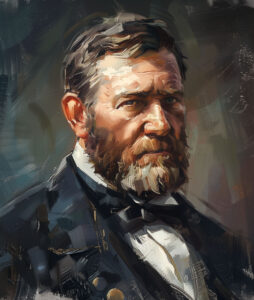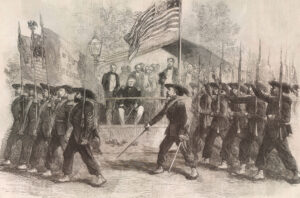Eric Foner is one of a handful of historians who have won the Bancroft and Pulitzer prizes within the same year. His widely acclaimed 2011 study The Fiery Trial: Abraham Lincoln and American Slavery also earned the Lincoln Prize. At the beginning of our conversation in his office at Columbia University, where Foner is the DeWitt Clinton Professor of History, I commented on his wall of awards, including a sword and a handsome bust of Abraham Lincoln. Foner laughed and said: “My wife has put her foot down: She doesn’t want any more busts of Lincoln. I have a bust in my office, another in our apartment and one more in our country house, but she has declared, ‘No more!’” When I joked that all Lincoln biographers must wish they could share his problem, Foner quickly reminded me that The Fiery Trial is not really a biography—it’s actually about the 16th president’s political rather than personal life.
Was your book inspired by the Lincoln Bicentennial bandwagon?
Quite the contrary, I tried to avoid it. I did not want to be lost in the shuffle of what some call the “Lincoln industrial complex.” We see political scientists, literary scholars, professional biographers, lawyers all contributing to the literature on Lincoln. Too much of this work reflects a fundamental weakness, that many of these writers do not have any deep sense of history. There is no real appreciation of historiography, or how our understanding of 19th-century America has changed in recent years. So although Lincoln may be illuminated, there is often no sense of Lincoln’s world. Good scholarship merges Lincoln into an updated picture of Lincoln and his world, Lincoln and race, and the political structure of the era.
Did you come at this project with some preconceived notions?
I had always been influenced by the view that emphasized Lincoln’s prejudices and slowness, especially in comparison with Radical Republicans. But when I examined carefully the topic of Lincoln and race, I concluded this was a flawed way to look at these issues—Lincoln was not Martin Luther King Jr., he was a man of his time. The first thing to realize is that he thought of slavery not exclusively as a matter of race. We can look at slavery in the 19th century as a political system, as an economic system, as an embarrassment to the international reputation of the U.S. There are many ways of talking about slavery within the 19thcentury context; race is only one of them.
What about Lincoln’s relationship to African Americans?
I decided that I would count up all of Lincoln’s contacts with African Americans. Lincoln was the first president to meet with African-American political figures—he met up with churchmen and delegates, treating them as constituents. I discovered that Lincoln’s ideas about blacks developed over time. I read the CD of his law career: over 5,000 cases, and only 34 of these had to do with black persons. But Lincoln grew and changed and eventually came to see blacks as part of American society. It’s so hard for us today to realize how truly significant this was for most white Americans in 1861.
Are historians obsessed with racism and its roots in Southern slavery?
Yes, but now we can see it was not just a Southern issue. Slavery was a national system, not confined to one part of the nation. By 1862 Lincoln understood slavery was an American, not just a Southern, system, and we have evidence of this from as early as his speech in Peoria [on October 16, 1854, in response to the Kansas-Nebraska Act].
How does the public respond to your views?
I find it challenging that the public is so willing to believe the war was inevitable: This is an analysis that removes human agency. Also I am disturbed by those who deny that the war was about slavery, suggesting it was instead only about states’ rights, or that the conflict was between an agrarian society and the rise of an industrial state. Unfortunately, this kind of simplistic thinking makes people comfortable with their concept of American history as a march of progress, the upward and onward movement of liberty.
What motivates you to try to shift perceptions about our past?
Reconstruction is one of the most misunderstood periods of American history, and I hoped my work would put the final nail in the Dunning School [a cadre of scholars whose work promoted the idea that Reconstruction ruined the South, and freedmen were incapable of self-government]. In 1998 my book The Story of American Freedom was motivated by the misappropriation of the term “freedom” by conservatives in the 1990s. I remember seeing Newt Gingrich declare emphatically on TV that his “Contract with America” was “the” American idea of freedom, and I found myself shouting back at the television: “Newt, yours is not the only one.” He did not have any monopoly on freedom, just the podium—and that pushed me to take on the topic at that time.
What about your view of Lincoln in The Fiery Trial? In the early years of the 21st century, the prevailing interpretation of Lincoln portrayed him as an alternate to the abolitionists—that those who demanded immediate abolition were fanatics, while Lincoln represented the only “prudent” course. This was a fundamental misreading of the relationship between social movements and political actions. There was a competitive but symbiotic relationship between Lincoln and anti-slavery leaders.
What do you think of Lincoln as a military strategist?
Again, Lincoln as commander in chief is not what I focused on— James McPherson wrote a very good book on that. But I still think Lincoln’s military greatness was he had common-sense insight. He knew the key thing was to defeat the Confederate armies, not to seize and occupy territory, but to bring the Union’s manpower advantage to the battlefield, to use a “cordon offense” as Grant wanted. Of course, we can’t just blame the generals for the first two years of war. After all, Lincoln did appoint Burnside, Hooker and McClellan.
Where do you weigh in on the role of black Confederates in the war?
The role of African Americans in Confederate army camps is greatly exaggerated. I find it particularly interesting that people who sympathize with Confederates are the ones in my opinion who invent legions of black soldiers. It is pretty ironic that this is intended to turn the tables on the North, to portray the South as some sort of multicultural paradise. Naturally some of the blacks might have served in the Confederate Army—there were 4 million slaves. Slaves have often taken up arms on the road to citizenship, and it would be foolish to think slaves could not bear arms and fight for their owners’ side, as they did in wars in the Caribbean, during the Napoleonic era. It’s no surprise that a few did, but there is little evidence for the combat role of blacks in the Confederate army. Instead we find more acting as personal servants, cooks, laundresses in Confederate camps, not being armed for battle.
How do you write your books?
I try to carve out some time every morning. I close down e-mail, block out the phone and try to write steadily for two or three hours. My other adage is that 90 percent of writing is rewriting. It’s so important just to get your ideas on the page. When you go back over your work, you can focus on style. Perhaps because I also do all my research in advance and spend time outlining my chapters in great detail, the book is basically in my head by the time I sit down to write; it’s a matter of getting it out onto the computer screen.
Originally published in the June 2013 issue of Civil War Times. To subscribe, click here.




